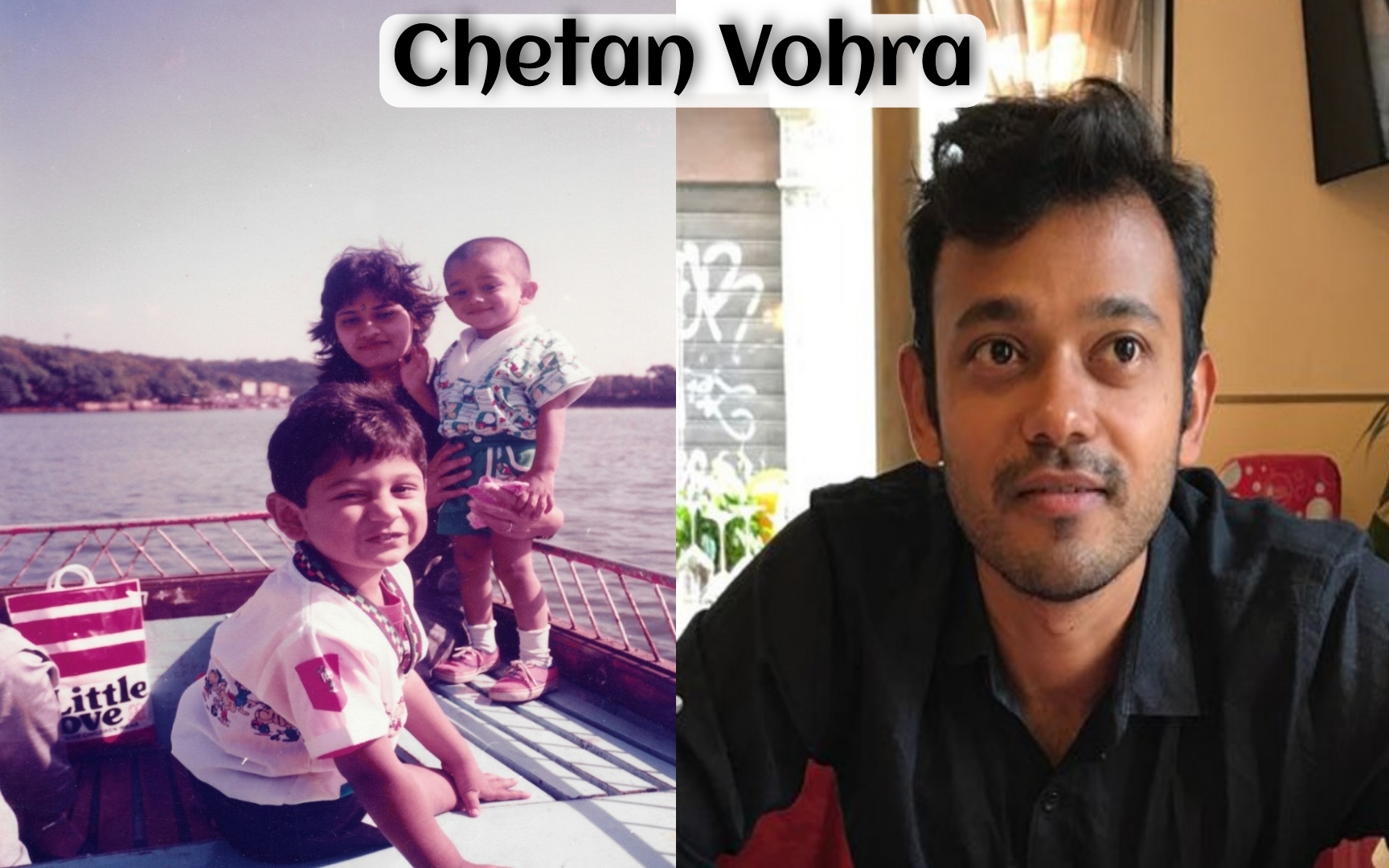
In the right ‘Sochu’
‘Sochu’ (inspired by the Hindi word ‘Soch’(thoughts)), a desi comic series is the brain child of Pune-based young entrepreneur, Chetan Vohra. A man of many interests himself, Chetan aims to make the children of today think, understand our ancient history in a fun and a non-violent way. Rajesh Govindarajulu finds out more.
Family
Born to Pankaj Dalichand Vohra and Anita, Chetan Vohra has an elder brother, Nilesh. The Pune-based Gujarati family is into construction business. Chetan was good with his studies until his tenth standard. His interest was playing badminton. “As far as I remember, I didn’t attend a single day of school in classes 9 and 10. Yet I scored around 75 percent in the Class 10 board exams,” he reveals. During those two years, he played badminton tournaments all over the country. He is grateful to the Principal of St. Vincent’s School, Pune, who permitted him to stay away from school all through Classes 9 and 10 to pursue his interest in badminton.
The student in him lost interest in studies while pursuing Classes 11 and 12. Chetan recalls how despite submitting nearly empty answer papers during his board exams, he was surprised to learn that he had actually cleared his exams. Chetan could not pursue architecture due his lower percentage of marks. He chose to do a foundation course in Visual Arts at the Vancouver Film School in Canada. He later joined Whistling Woods International film school and became a cinematographer over the next two years.
The 17-year-old had fixed things all by himself in Canada and it had indeed been a learning experience.
“My foundation in Vancouver helped me progress in life. I topped my batch and was involved in some short films. Thereafter, the camera exposure at Whistling Woods was great and absolutely commendable. Many videos and advertisements projects came my way. I was part of Bollywood movies like ‘Myoho,’ and ‘Phamous.’ The short film, ‘Valmiki Ki Bandook’ was remade into ‘Phamous.’
He realized that one’s energy gets wasted, if the movie bombs at the box office. This prompted him to look out for something new and it had to be something that he could do all by himself. “I didn't want to blame others for what happened to me,” he reveals.
Chetan and his big family would often go on holidays together. A great time to catch up, it was an opportunity for him to interact with a number of kids. Arhaan, nephew of his sister-in-law, Ulka, was his favorite.
“It was an enriching experience,” chuckled Chetan. And, guess what, his interactions with Arhaan proved to be a catalyst in coming up with ‘Sochu’.
… Thus ‘Sochu’ happened
Chetan Vohra watched everything that kids were glued to. He was appalled by the violence portrayed in these programs.
Speaking about today’s ‘Hero’ and ‘Villain’ in the comics of today, he says, "The child begins believe that he or she is a ‘Super hero’ and identifies a villain in real life. This can be done with, by finding a common ground. This is better than defeating someone. In fact, the villain is the hero in his or her own mind. Therefore, it makes sense to have fewer super heroes. A real hero does many more good deeds. The idea behind ‘Sochu’ is to keep the tone non-violent and allow kids to understand and assimilate concepts in a calm manner.
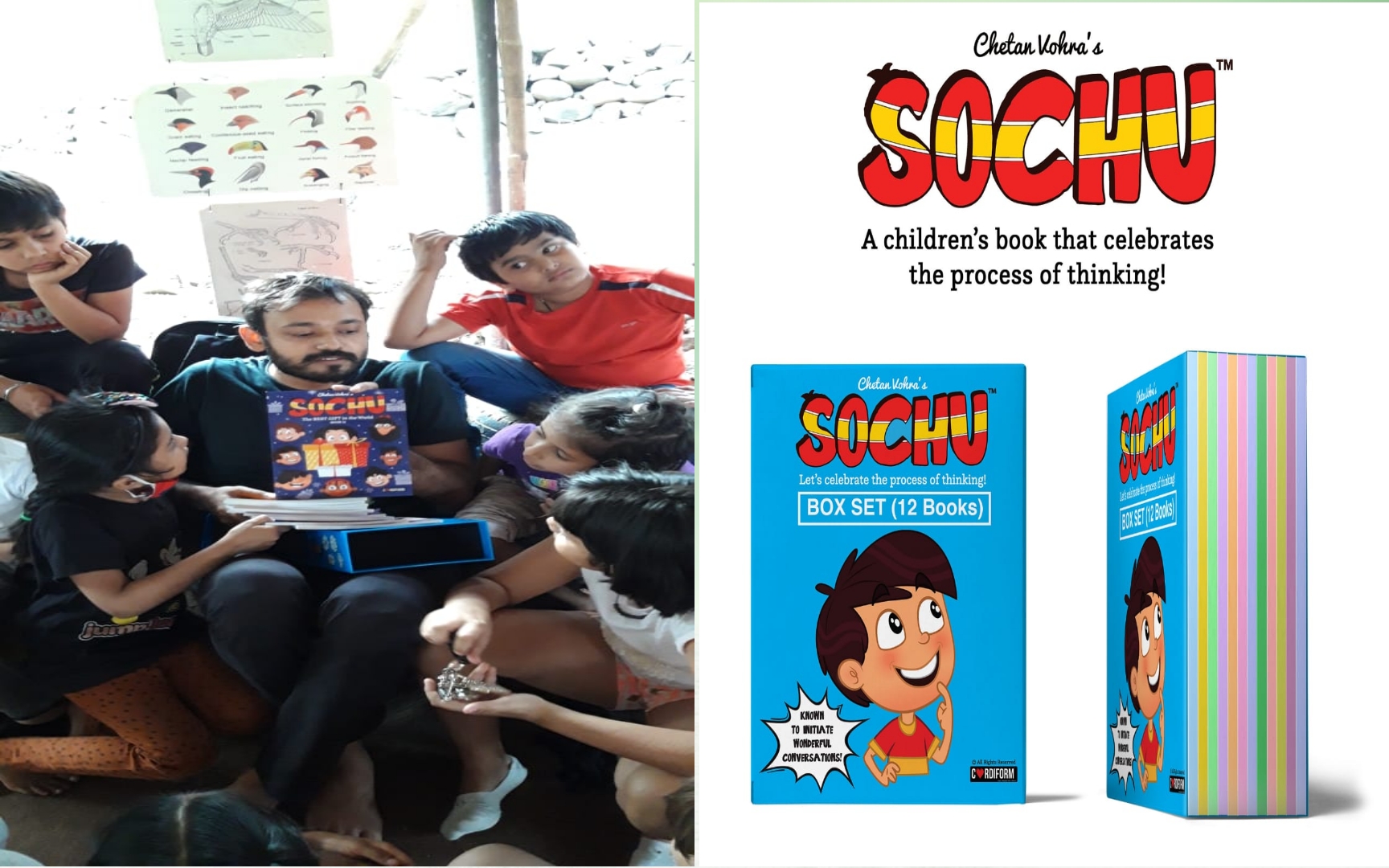
Conceptualization and team
Hailing from the entertainment industry, at first, Chetan decided to make non-violent entertainment for kids that has something wholesome to take away from. He invited his friends, Vilas Algude and Deven Gandhi, who were always interested in writing but never managed to get to doing it. Their brainstorming sessions began by 7 pm and lasted till midnight (sometimes even till 2 am).
“At first, we asked ourselves, ‘if there was one gift we could give children, what would it be?’ The answer was: the ability to have their own thoughts!”, explains Chetan.
“Recently, I read the book ‘Teach Your Child How to Think’ by Dr. Edward de Bono. It has exactly same line mentioned on the back cover. I got goosebumps when I read it,” he adds.
This is how the journey of ‘Sochu’ began. “After writing 26 stories and creating the first two books, as a market test, we went to all the popular channels to pitch it as a TV series, through our partnership with Reliance Animation in Pune,” he says. But the channels did not see it as something children would be interested in. They wanted the same hero and villain stories or the chase comedies and the team was unwilling to create them.
“I dropped the idea of joining my father’s construction business to make the films and cartoons. It was something that I always wanted to do. So, compromising on what I want to do was definitely out of the question,” he says.
Chetan made ad films, worked as a cinematographer and did other gigs to support himself (although his needs were minimal). The rest of the money always went into making ‘Sochu’. I knew I had to make it one way or another.
The young lad, Varun Nair had done the initial artwork. Chetan found him on Facebook and got in touch with him. “I am yet to see him or speak to him. All the communication was through email,” reveals Chetan. Varun is doing well in Europe. Chetan has kept the core of Varun's work intact and worked around it. He has a good team alongside.
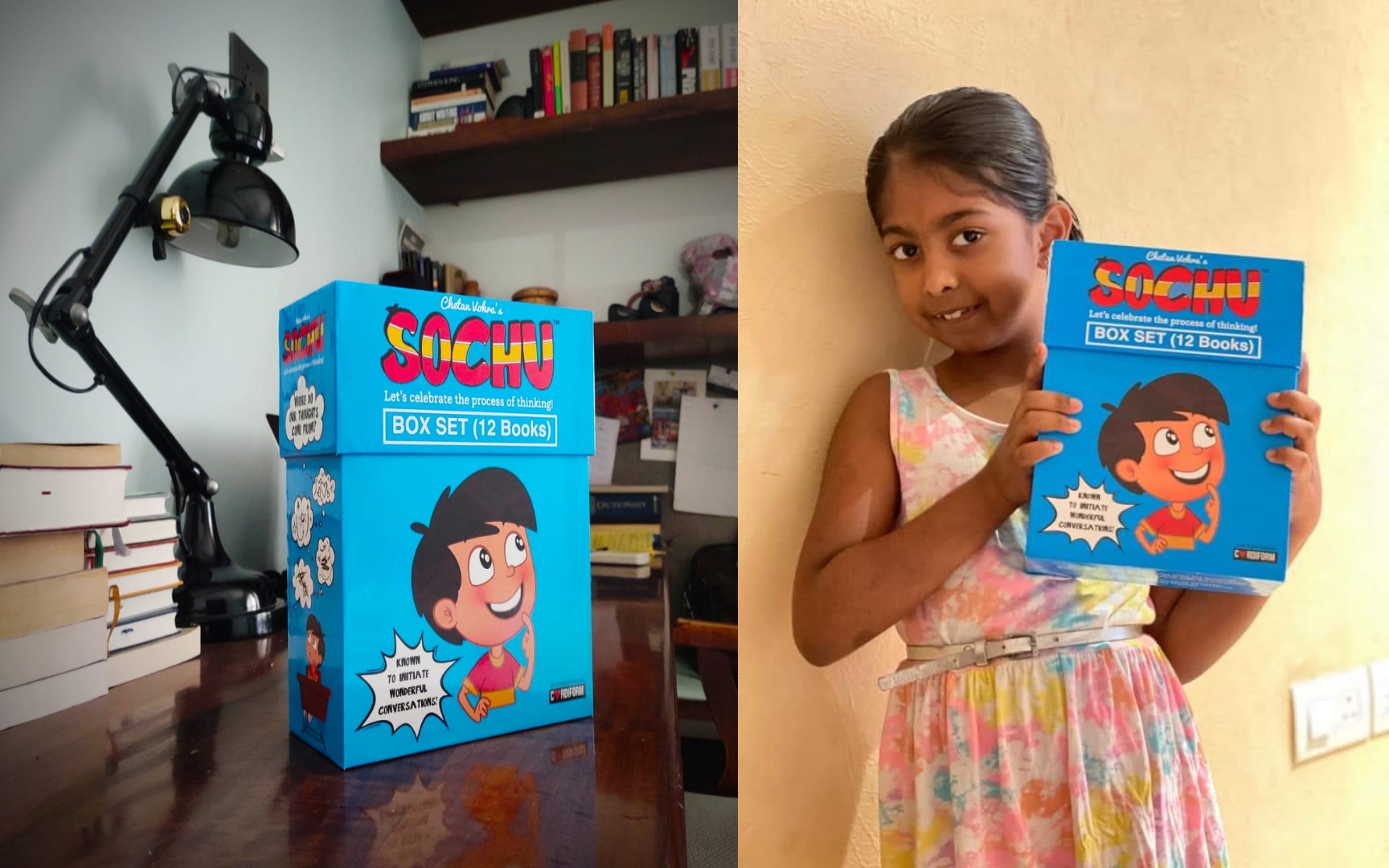
The core of ‘Sochu’ and Ancient Indian heritage
Chetan begins by pointing out how many schools of today do not have moral instruction classes. He says comics like ‘Sochu’ are a fun way to pick up ethics and morals. Thinking outside the box helps quite a bit.
“Now, we are trying to push our ideas without including violent content. Newer things will happen and resources will ensure quicker reach. We need to reason out ‘Old India’ for the ‘Young India,’” he says.
This will help youngsters not to stray away from good things. Chetan adds that it’s our duty to explain the meaning of all our practices. They will take it forward by cherishing it.
“You know Matrix and Ayn Rand are inspired by us. Matrix say that they like the Ramayana. These guys have redefined our culture. They have expressed it in their own creative way. We can do it with characters like ‘Sochu,’” smiled Chetan.
He points out how India was blessed with an amazing education system back in those days. Education was experience-based. Spirituality was evident in our land as we belong to the land of saints like Ramana Maharishi and Swami Vivekananda.
“Back then, we never bothered to explain the reasons behind our festivals. No one took efforts to teach us about our traditional value system. No one could explain it the way I could understand. Kids could always think. Our survival trait is thinking. This is absent in animals. Suppose, we live in a world where thinking is not required, we will not survive,” he says. Therefore, Chetan decided to make kids think via ‘Sochu.’ Kids, who are above four years, will be comfortable with it. But ‘Sochu’ has found readers among older people too. The objective is to put the readers in ‘Sochu’ (Thinking mode).
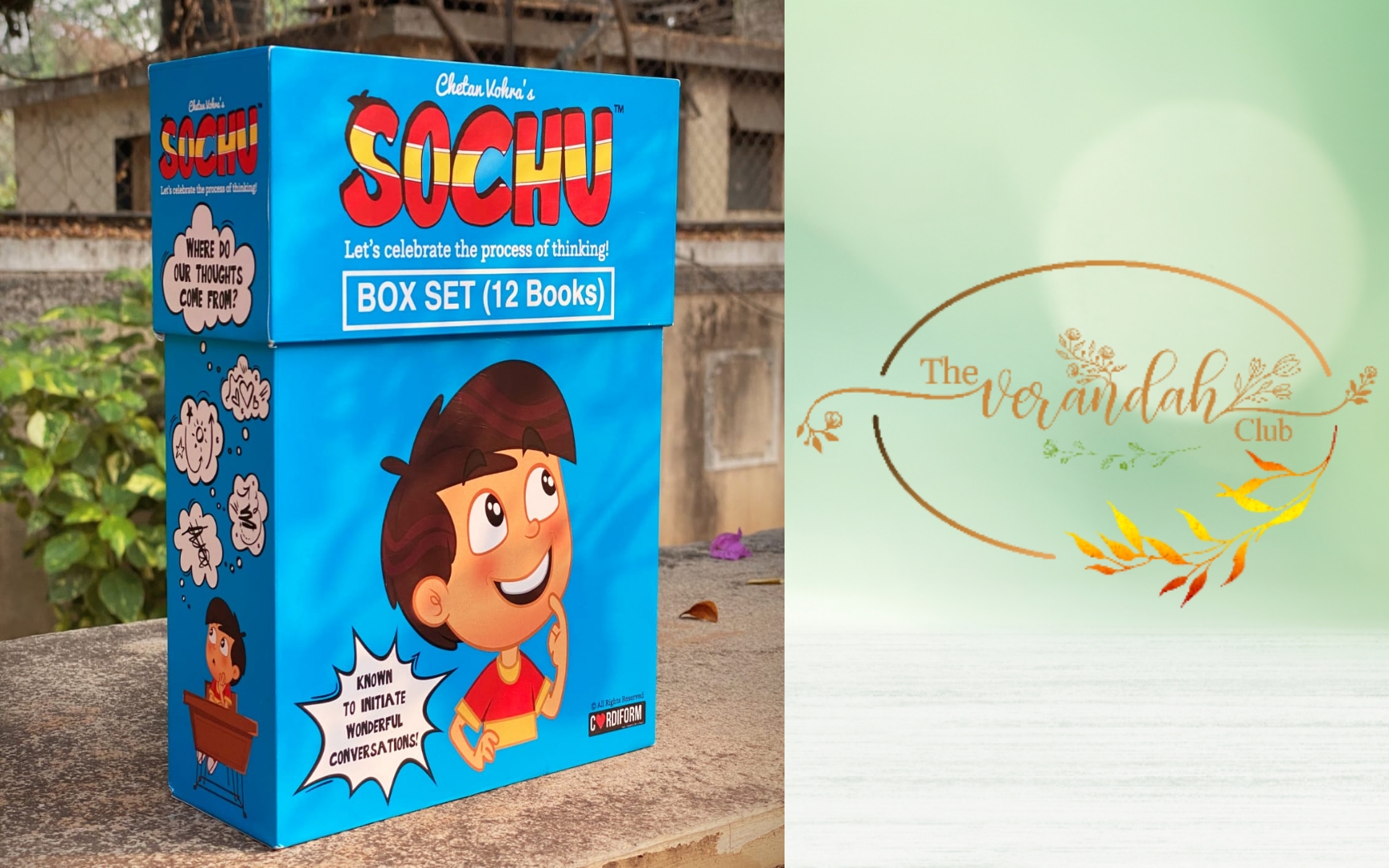
Printing
Chetan has worked across multiple verticals such as animation, design, cinematography, films, education, and so on. To top it all, he is quite good with various software. “I believe that I was extremely well-equipped to take on the mammoth task of creating something offbeat from scratch, and execute it till the end,” he says. Since, he studied cinematography, the understanding of how colors work was innate.
“The colors used in ‘Sochu’ are intentionally super bright and flashy to attract children. Since, they are exposed to so much information everyday through gadgets, it is difficult to hold their attention for too long. Thus, I personally went back and changed all the colors of each and every character myself, and yes, I broke a lot of rules too!” he exclaims.
The team was lucky to have found wonderful Akruti Printers from Pune for the first time. The printing team has put in the love required to create ‘Sochu’ and didn’t treat it as a mere print job.
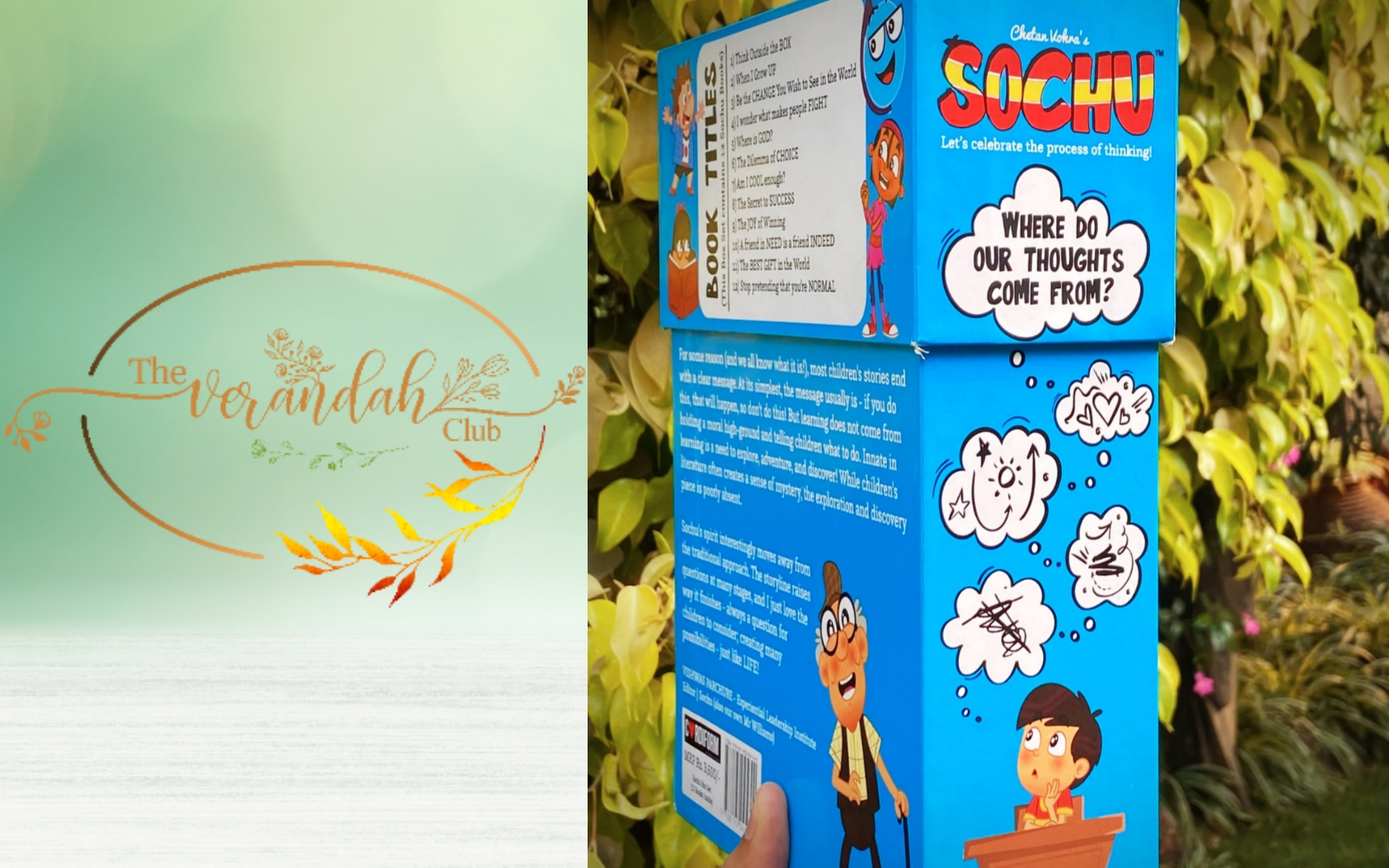
The love for ‘Sochu’
The little boy, ‘Sochu’ is seven years old and is doing well these days. The response has been quite good. 'Sochu' by Chetan Vohra under the label Cordiform Films has been a success. However, Chetan takes minimum credit for it. His first two books were received well, and now the full set comprises of 12 books priced at Rs.3600. He always wanted the content to have a heart.
“Sochu is offbeat and convey messages through slapstick comedy.” Chetan loves Charlie Chaplin movies as they had deep meanings and are timeless favourites.
Chetan continues: “After six years of believing in myself, despite failing again and again, being rejected by channels over and over again, I continued to do what I wanted to do. It feels great, now that we have a substantial product out there.”
Not that these books were made to hear nice things, but it definitely helps getting positive feedback and appreciation from readers. “We are humbled with the response to the books. Parents call and message us from all over the country telling us about their experiences with ‘Sochu’ and their kids, and we couldn’t be happier,” Chetan affirms.
Orders can be placed online and delivery is prompt. Online marketing on platforms like Facebook have been very helpful. Chetan does interactive sessions too. The Pune-based creative entrepreneur spends most of the income on marketing, for he considers it to be an investment.
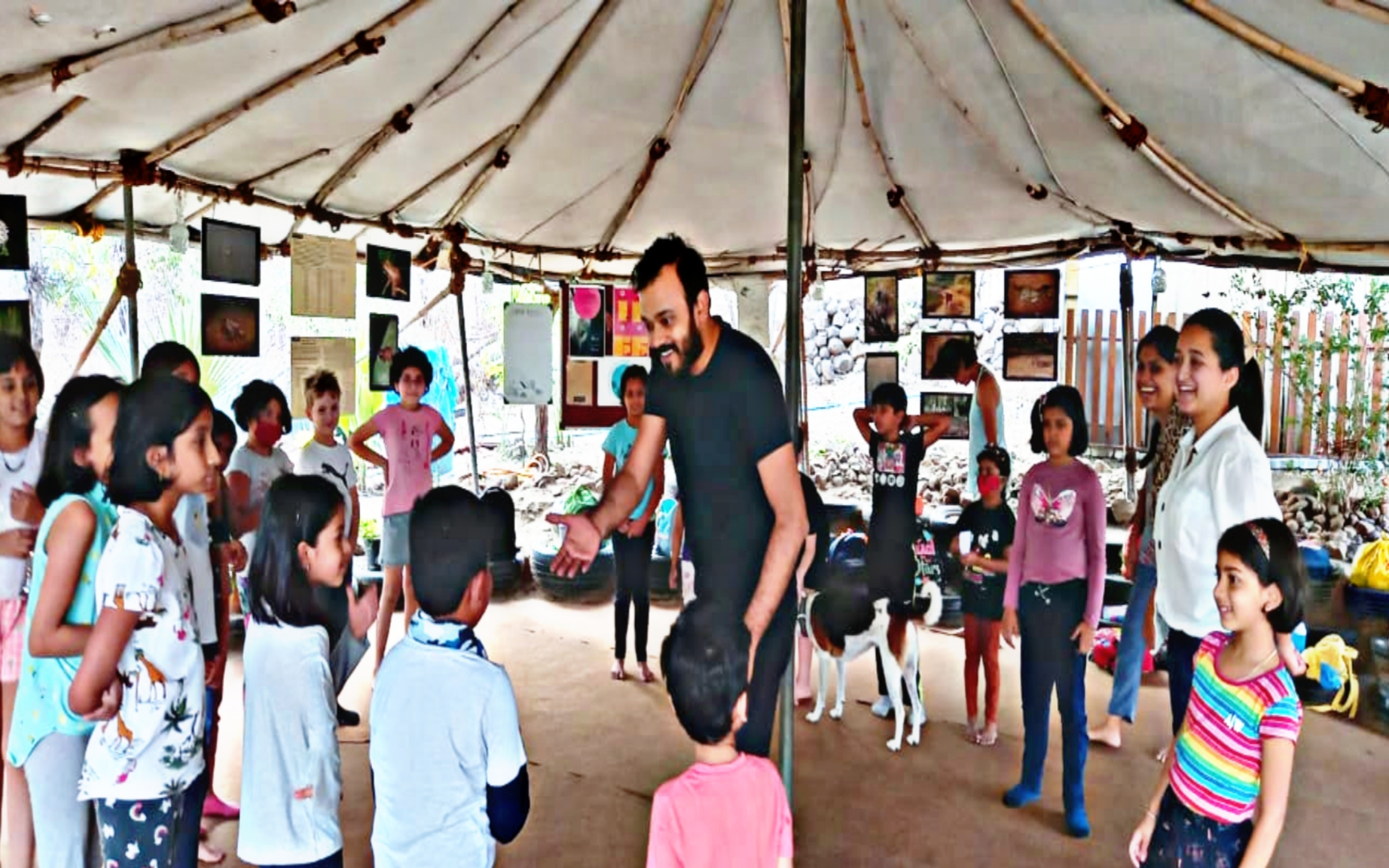
Staying inspired
Over the years, Chetan has had many mentors. For instance, his art teacher from school, Mr. Duprat, always had encouraging words for him. His badminton coach Mr. Harshal Shimpi has guided him through his formative years that were extremely joyful because of badminton.
“I used to involve in physical fitness for 1.5 hours in the morning, head to school, then back to 2 hours of badminton practice in the evening,” reminisces Chetan.
In Vancouver, Chetan used to watch at least five movie DVDs of 5 films from his friend, Brian Sabbeth. The next day, he would return them all and borrow more. While studying at the Vancouver Film School, he recalls how he watched at least 1200 films.
“In Whistling Woods, my cinematography teacher, Sundar sir was a huge influence. His passion for cinema seeped into me too,” he continues.
Then comes, Mr. Ranjan Shandilya, the director who let him shoot his first film. He has been an ongoing influence about spirituality and cinema. “Dissecting the Ramayana and Mahabharata and discussing the uncanny resemblances to other stories and films. We also went through a lot of shayari (poetry) and I learnt a lot away while working with him,” says Chetan.
Mr. Vishwas Parchure who taught the methodologies of Experiential Education (EE) and let him collaborate with him and help him visualize the theories of EE to create a digital experience over Zoom.
“Hey, how can I forget one of my biggest inspirations in the last five years: Malcum Marolia, my yoga teacher. His approach to yoga and breath control has stayed with me, not only through the practice but in everything I do,” he says. He always said that one should practice yoga, not to become better at it, but to become better at everything else too.
But the list is incomplete without the mention of his family members. “I am grateful to my brother for holding the fort so that I could wander and explore new things. My parents for letting me be the crazy one. I am loved immensely by my entire family and I hope that I can pass on that love.”
The road ahead
“It is a great feeling, although I will need a big break soon. It is tiring,” says Chetan. A number of new ideas are underway. He says that a number of international comic creators had assimilated much from Indian ideas.
“It feels good that we can keep going with other projects and that what we have to say holds some value in people’s lives,” he signs off.
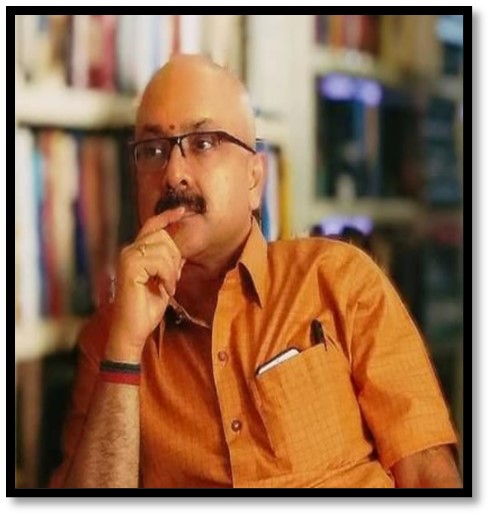
Mr. Rajesh Govindarajulu is one of the founding members of the Verandah Club Pvt. Ltd. He is a leading columnist, historian, jeweler, entrepreneur, and a heritage enthusiast who is earnestly working to revive the past in the light of the present. Experiential learning about the history of Coimbatore is his main course of interest and he is also a panel member of many colleges in the city.
NEXT ARTICLE
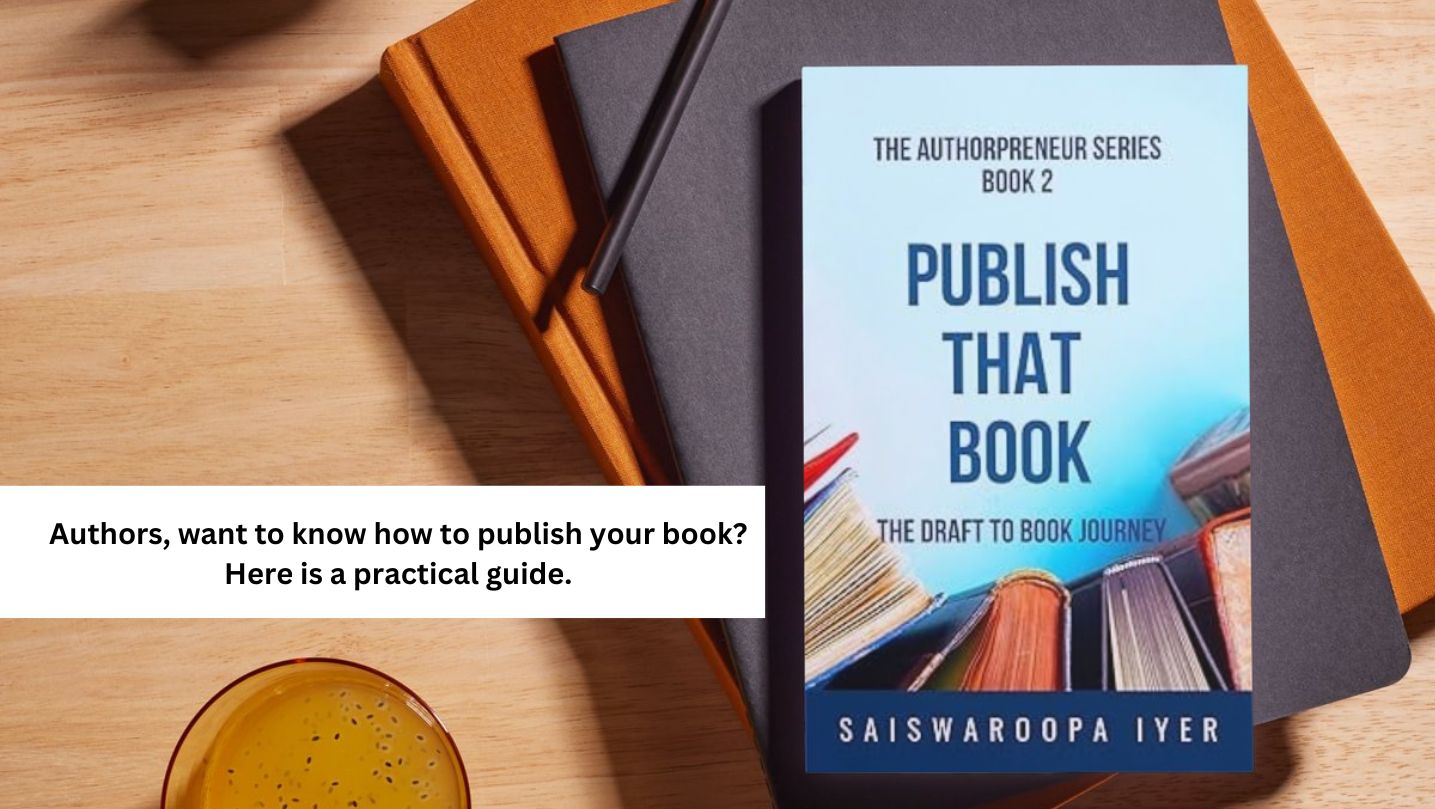
Saiswaroopa Iyer is an author who needs no introduction. She is one of the authors who pioneered Puranic fiction in India with books exploring tales f...
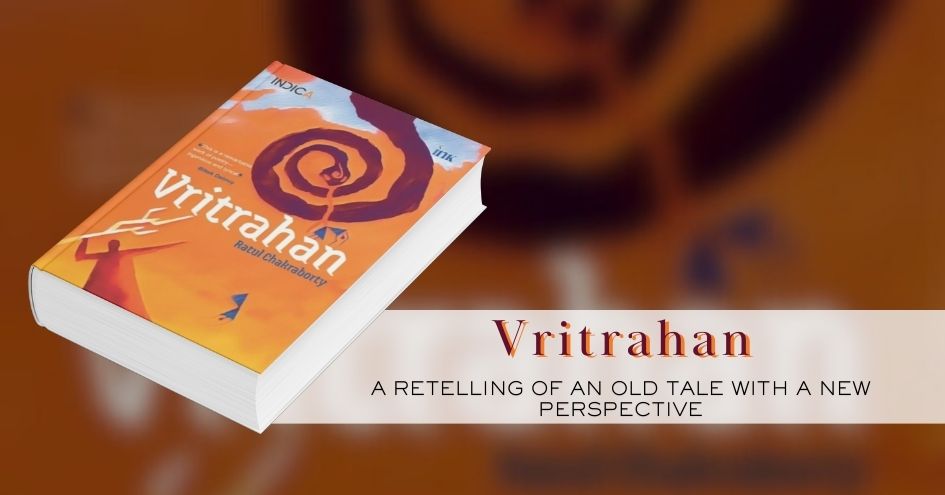
Indra killed Vritra using his Vajra. Once again, good won over evil and dharma over adharma. This is a story most Bharatiyas know. The story is a pa...
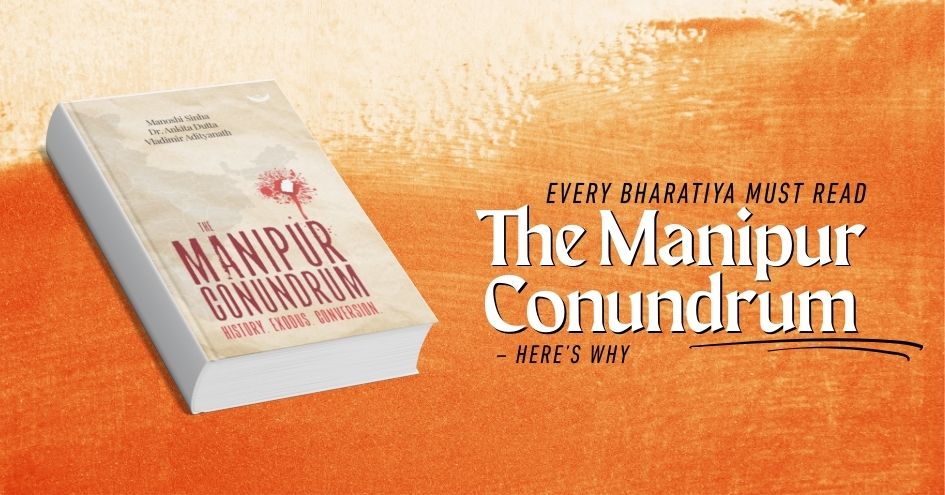
The recently-released book on Manipur titled The Manipur Conundrum – History. Exodus. Conversion. – is the result of tiring efforts by three Bharatiya...